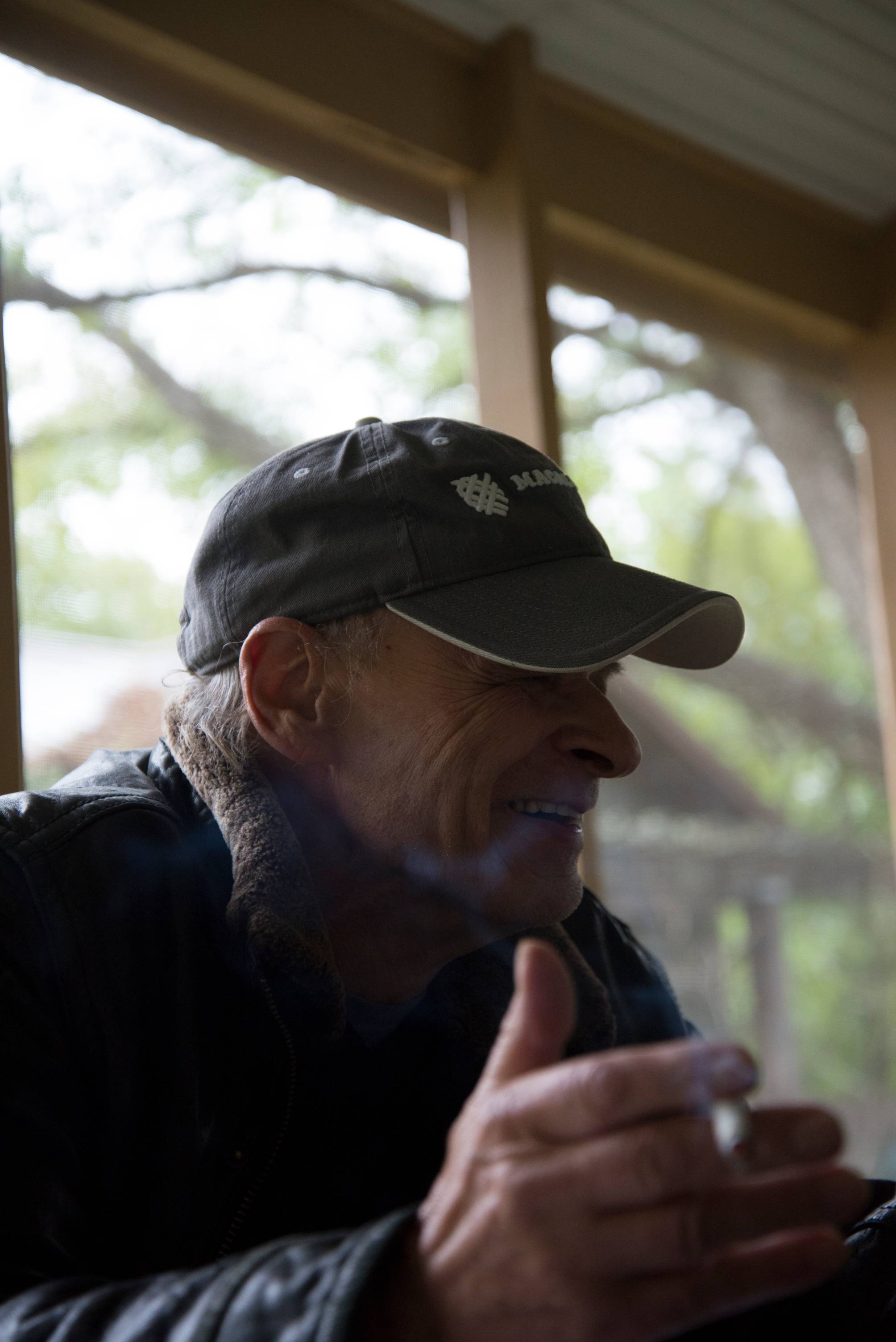Seventeen Years in, Tim O'Brien Is Right Where He Belongs
Ben McCormick | Spring 2018

Tim O’Brien drove a car to his workshop—he must have—but I’m not totally convinced he didn’t sprout from the soil when I wasn’t looking. In a similar way, I know he smoked two cigarettes while we talked on the porch of Katherine Anne Porter’s childhood home, but I don’t remember him lighting either of them. Our photographer doesn’t either. His ring finger fastened a black lighter to his palm. I swear it never moved.
He isn’t from the Austin area (Texas, anyway, he’s from Austin, Minnesota), but he might as well be. He’s been with Texas State’s Creative Writing MFA program in some capacity for seventeen years now. When I remind him he doesn’t need to teach anymore, he says, “You’re right. I don’t.” He knew I’d ask why he chooses to anyway: “Earlier today I freaked out. Like, what the hell do I say? The answer is I don’t really know. I know part of it. But it sound so cliche-ish that it doesn’t sound true, which is you want to give back what you got. But I’m not that open-hearted a person.” We laugh. He takes a drag off his first mystery cigarette.
It’s this naked honesty that keeps his workshops packed. There isn’t an ounce of the guy that isn’t real. His Macalester College baseball cap might be from pre-9/11, and his leather jacket looks like it’s crossed many state lines. “My responses to stories are like any ordinary reader’s,” he told me. “They’re emotional and they’re visceral and they’re pretty absolute. Read it and, ‘I hate it,’ ‘I love it,’ it’s very rarely much in between. If I just ‘like’ a story, it means I don’t like it. ‘Liking’ means ‘love it.’ And the word ‘like’ means, to me, half-heartedness, and it means there must have been flaws in it somewhere that stopped me from loving it, and what are they?”
Most people are hesitant to criticize work with their name on it because of publicity or image or whatever, but for O’Brien honesty is non-negotiable. About a recent episode of NBC’s Emmy-winning show This Is Us he co-wrote, he said: “It got almost uniformly good reviews, much to my surprise because I thought that parts of it were...not terrible exactly, but bad.”
His honesty might seem too blunt, too typical of the worst Texan stereotypes about “toughness,”—and don’t get me wrong, I don’t want to drop gloves with the guy; O’Brien’s pretty limber for seventy-two—but the notion he isn’t open-hearted is a bunch of hot air. It’s no accident everything everything he writes is a direct pathway to it. When I ask him how the written word stays relevant in the world of TV, film, and podcasts, he doesn’t need time to think. “There’s a private way of touching a heart,” he says. “You’re in the book in a way that I’m never quite ‘in it’ when I’m watching something, say a movie or a television show. There’s an actor there and I’m watching him do these things. I’m not making him get up and walk, but when you’re decoding these words you’re making Huckleberry Finn tiptoe down a path...there’s an intimacy to that that is impossible to replace.”
Anyone who’s been in his workshop knows generosity with young people is one of his operating principles. It’s why at one point he quit writing entirely: “I decided when my first kid was born in 2003 that I was going to be a good father no matter what, even if it meant abandoning what I love and do best: writing. And I did it. I decided I was going to be a dad.”
O’Brien just finished his first book since that time, finding time to write again as his kids grew older and more independent. His youngest son, Tad, 12, named it. Tad asked his father, “are you ever going to finish this thing?” O’Brien said, “maybe.” Tad asked about the title, and O’Brien said, “I don’t have the slightest idea,” and Tad shot him straight: “why don’t you just tell the truth and call it your ‘maybe book?” O’Brien turned Dad’s Maybe Book into a publisher near the end of September. He then signed an IOU for Tad who didn’t mince words about payment: “just give me what you think it’s worth.” Apples really don’t fall far from their fathers.
If there ever was a line between Tim O’Brien the writer and Tim O’Brien the man, I can’t see it now. It doesn’t take long in his workshop to realize when he’s spending ten minutes on a single sentence in a student’s work, which he loves to do, he’s talking just as much about himself. He’s open about being a “slow, slow, slow writer,” and believing in the “little things.” At one point in our conversation he whittles a writer’s real job title down to its core: “emotion giver.” And I realize the reason that I don’t see him light his cigarette or pull into the Katherine Anne Porter House is simple: Tim O’Brien doesn’t try to do much anymore. He just is.